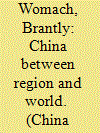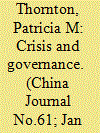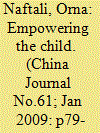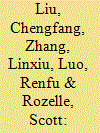|
|
|
Sort Order |
|
|
|
Items / Page
|
|
|
|
|
|
|
| Srl | Item |
| 1 |
ID:
086687


|
|
|
|
|
| Publication |
2009.
|
| Summary/Abstract |
This paper explores three dimensions of China's external relations. First, China can be viewed as a region-state, one in which scale and the diversity of the domestic political economy make it necessary to view the state as an interrelationship of parts even in its external relations. As a sovereign nation, China is a unitary actor unlike international regions, but it is not as uniform an actor as most other states. Second, China is a multi-regional power. Its relationships with the various international regions in which it is a major power are affected by the fact that it is not enclosed by a single region. Lastly, although China is not likely to be in the position of challenging the United States as a global great power in the foreseeable future, its stature as a global presence in a multi-nodal world is already assured. Its global foreign policy of multi-polarity is fundamentally shaped by its situation of being incapable of domination.
|
|
|
|
|
|
|
|
|
|
|
|
|
|
|
|
| 2 |
ID:
086691


|
|
|
|
|
| Publication |
2009.
|
| Summary/Abstract |
How crisis-prone is the reform-era Chinese state? Whereas some have characterized it as a regime suffering from a hidden crisis of governance, or instead as one that has responded effectively to critical challenges by redesigning its core institutions, this article examines the political utility of crisis as a mobilizational tool from the Mao era to the present. Using the SARS outbreak of 2003 as a case study, I seek to demonstrate that, in fact, the rhetoric of crisis can help to legitimate extraordinary interventions by social and political elites, subvert the standard bureaucratic procedures that characterize normal politics and create political space for extraordinary mobilizations of resources to overcome challenges. The continuing deployment of crisis rhetoric by the Hu-Wen leadership can thus be read as one legacy of the mobilizational dynamics of the Mao-era state.
|
|
|
|
|
|
|
|
|
|
|
|
|
|
|
|
| 3 |
ID:
086695


|
|
|
|
|
| Publication |
2009.
|
| Summary/Abstract |
The last two decades have witnessed the emergence of a new discourse of children's rights in the People's Republic of China. The present article traces the social, political, and economic circumstances that have led to the emergence of this discourse, describes the institutions that have been involved in its production, and considers the various ways in which urban Chinese parents of different socioeconomic backgrounds engage with the notion of children's rights in their day-to-day lives. Drawing on the results of ethnographic fieldwork conducted in Shanghai schools and homes, as well as on a survey of legislative codes, teachers' manuals, academic literature, childrearing guides, and media articles published in China since the early 1990s, I argue that a new mode of speaking and thinking about children-as "subjects" rather than "objects", and as "independent persons" rather than mere "appendages" to their families or to society-is emerging in contemporary China. While this new conceptualization of the child is fraught with tensions and contradictions at the level of both discourse and practice, I nonetheless argue that the notion of Chinese children as subjects bearing rights carries important implications not only for family relationships but also for state-citizenry engagements in 21st-century China.
|
|
|
|
|
|
|
|
|
|
|
|
|
|
|
|
| 4 |
ID:
086693


|
|
|
|
|
| Publication |
2009.
|
| Summary/Abstract |
Not since China's economic reforms has there been such an outpouring of care and attention given to rural migrants in cities. However, there is a gap between the politics of rights as established at the national level and as ignored among rural migrants themselves. My ethnography of a rag-picking migrant woman in Harbin examines why and how this gap occurs through what I call "forced flexibility." It means the troubling processes by which the migrant's desire to make a permanent home is disrupted by the coupling of increasing conflicts over land rights and urban policies that privilege urban household registration holders. Tracing the migrant's struggles to reclaim her rural land as well as to purchase urban housing, this article suggests that the predicaments of rural migrants occur because these migrants are not merely excluded, but also included "through exclusion" in a post-Mao fantasy that guarantees their rights and, simultaneously, limits them through numerous modifications and exceptions at the local level.
|
|
|
|
|
|
|
|
|
|
|
|
|
|
|
|
| 5 |
ID:
086698


|
|
|
|
|
| Publication |
2009.
|
| Summary/Abstract |
Although quality may be as important as quantity in public infrastructure management, little research has studied changes in the quality of China's infrastructure investments. This study seeks to document the quality of infrastructure projects in China's villages and to measure whether or not quality has suffered as China's investment effort has risen. The study also examines if satisfaction is rising. Using data from 100 villages in China, we have found that both the quantity and the quality of infrastructure investments have increased. We also find that rural residents are more satisfied with projects, especially when they are higher quality.
|
|
|
|
|
|
|
|
|
|
|
|
|
|
|
|
|
|
|
|
|